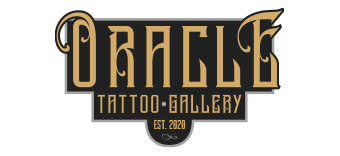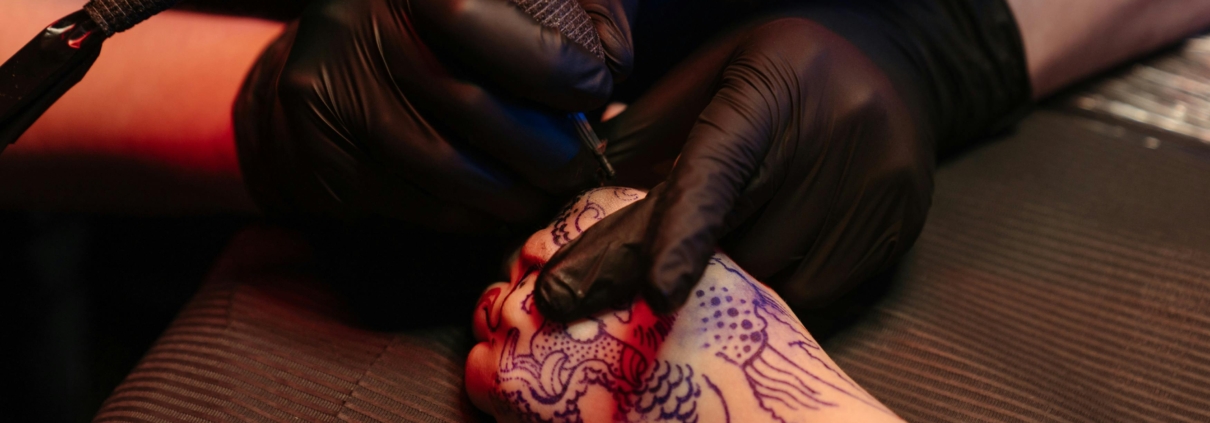Tattoo Dictionary: Vocabulary to Make Your Tattoo Appointment Hassle-Free
Have you ever heard two tattoo artists talking about something in the shop and wondered what they were talking about? There are a variety of terms in the world of tattoos that have unique meanings. Well, you are in luck! This tattoo dictionary is going to help you understand the a majority of the vocabulary used in the tattoo shop. Now your next tattoo appointment is going to be hassle-free.
Apprentice
An apprentice in the tattoo industry is akin to an apprentice in any skilled trade — they’re learning the craft under the tutelage of a seasoned mentor, usually an experienced tattoo artist. This journey involves not just observing but also hands-on learning, where apprentices assist with various tasks in the studio, from cleaning and sterilizing equipment to preparing clients and setting up tattoo stations. As they progress, apprentices may begin tattooing under close supervision, starting with simpler tasks like outlining or shading before moving on to more intricate work.
Blowout
This phenomenon typically happens when the tattoo needle penetrates too deeply or moves too quickly, causing the ink to spread beyond the intended boundaries of the design. Factors like skin type, tattoo location, and the skill level of the artist can also contribute to blowouts. While blowouts are often permanent, experienced artists may employ techniques to minimize their impact or incorporate them into the overall design, turning what could be a flaw into a unique feature of the tattoo.
Bodysuit
A bodysuit refers to someone whose whole body has been covered in tattoos. This can mean that you have a single cohesive tattoo or multiple covering your skin. In other words, a bodysuit means that there is no naked skin to be seen.
Cover-Up Tattoo
Cover-up tattoos are the ultimate solution for transforming or concealing an existing tattoo that no longer resonates with the wearer. Whether it’s an outdated design, a regrettable choice, or simply a desire for change, cover-up tattoos involve strategically incorporating new elements or imagery to mask the old tattoo effectively.
Eco-Tattooing
Eco-tattooing represents a sustainable approach that minimizes the environmental impact of the tattooing process. This involves using eco-friendly tattoo products, such as vegan-friendly and cruelty-free inks and aftercare products, reducing waste through recycling and responsible disposal practices, and implementing green initiatives in the studio, such as energy-efficient lighting and water-saving measures.
Flash Tattoo
When you walk into a tattoo studio and browse through sheets of pre-designed artwork displayed on the walls or in portfolios, you’re looking at flash tattoos. These designs, often featuring traditional or popular imagery like skulls, roses, or anchors, serve as inspiration for clients looking to get tattooed on the spot. Flash tattoos offer a convenient option for those seeking a quick and straightforward design without the need for extensive customization.
Liner
The liner machine, equipped with needles configured in a tight grouping, delivers precise punctures to the skin, laying down the framework for the tattoo.
Linework
Linework forms the backbone of a tattoo design, providing structure, definition, and clarity to the artwork. This technique involves using lines of varying thickness and weight to outline shapes, define contours, and add intricate details to the design.
Ink Caps
Ink caps are small, disposable containers used by tattoo artists to hold tattoo ink during the tattooing process. These tiny cups, typically made of plastic or silicone, are arranged on a workstation or tattoo tray, each filled with a different color of ink. Ink caps ensure hygiene and cleanliness during the tattooing process by preventing cross-contamination between colors and providing easy access to ink for the artist.
Ink Sac
Sometimes the body rejects the ink. If you still have a second skin or wrapping on the healing tattoo, that ink may get trapped under the bandage. This may sound like a very gross problem, but an ink sac is normal and helps heal the tattoo. Also, touching an ink sac can be oddly satisfying—if you’re into that sort of thing.
Plasma
Plasma is the liquid component of blood that oozes from the skin during the tattooing process, mixing with the ink and forming a thin layer over the tattooed area. Tattoo artists use sterile wipes to gently wipe away excess plasma and ink, ensuring a clear view of the tattoo and maintaining a clean working environment during the tattooing process.
Numbing Cream
This topical anesthetic is applied to the skin before tattooing, numbing the area and dulling the sensation of pain or discomfort.
Second Skin
After you have sat for your tattoo session, you are going to be given a second skin, which is a protective barrier film or dressing applied to a fresh tattoo to shield it from external contaminants and aid in the healing process. This transparent, breathable film creates a barrier between the tattoo and the outside world, preventing bacteria, dirt, and friction from interfering with the healing process.
Shader
The shader machine, equipped with needles configured in a broader grouping, delivers a series of punctures to the skin, depositing ink in a controlled manner to create smooth gradients and solid areas of color.
Sketch
Before the tattooing process begins, artists often create a rough, preliminary drawing or design known as a sketch. This sketch serves as a visual reference for both the artist and the client, helping to visualize and refine the tattoo idea before it’s permanently inked onto the skin. During the sketching process, artists can experiment with different compositions, layouts, and elements, tailoring the design to suit the client’s preferences and anatomical considerations.
Tattoo Station
Every tattoo studio has a designated area where the magic happens — the tattoo station. This workstation is equipped with all the tools, equipment, and supplies necessary for tattooing, including tattoo machines, needles, ink, gloves, and sterilization equipment. The tattoo station is where artists bring their creative visions to life, working closely with clients to design and execute unique and meaningful tattoos.
Tattoo Gun
At the heart of every tattooing session is the tattoo gun, a handheld device that delivers ink into the skin to create permanent designs. Also known as a tattoo machine, this versatile tool consists of several components, including a motor, needle, grip, and foot pedal. The motor powers the needle, which moves up and down rapidly, puncturing the skin and depositing ink with each insertion. The grip provides stability and control for the artist, while the foot pedal allows for precise control over the tattoo machine’s speed and movement.
Tattoo Machine
Another term for the tattoo gun, the tattoo machine is the workhorse of the tattoo industry, responsible for transforming artistic visions into permanent works of art. This versatile tool comes in various configurations and designs, ranging from traditional coil machines to modern rotary machines, each with its own unique advantages and applications. Tattoo machines are carefully calibrated and customized to suit the artist’s style and technique, allowing for precise control over needle speed, depth, and penetration to achieve the desired results.
Contact a Tattoo Shop in Philadelphia Today
Now it is time to put this tattoo dictionary to good use! Understanding these tattoo terms will empower you to communicate effectively with your tattoo artist, ask informed questions, and make confident decisions about your tattoo design and experience. So, whether you’re getting your first tattoo or adding to your existing collection, armed with this knowledge, you’re ready to step into the tattoo studio with confidence and ease.
When you are ready to contact, reach out to Oracle Tattoo Gallery. We offer custom tattoos in a variety of designs. Schedule your consultation today by calling 215-638-1601 or by filling out the consultation form. Don’t forget to check out our latest projects on Instagram.



